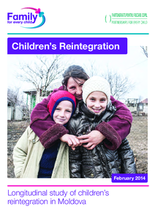This important report documents a 22-month longitudinal study of the reintegration of children in residential care in Moldova. This research was carried out by Partnerships for Every Child, a Moldovan Non-Governmental Organisation (NGO), with the support of Family for Every Child. This is part of an overall study – which also examines the reintegration of street children in Mexico and of child domestic workers in Nepal – aims to identify successful elements in strategies to ensure the sustainable reintegration of children without parental care by examining the reintegration process over four phases. This study documents the reintegration of 43 children aged between 12 and 14 from residential care to their parents’ homes as a consequence of reductions in the use of large scale institutions in Moldova. All but one child had spent between four and seven years apart from their families.
The research was conducted in four distinct phases:
Phase 1 – pre-reunification: examining why children were in residential care, and the preparations for and expectations of the reintegration process.
Phase 2 – reunification: looking at how the process had gone one month after children had returned home.
Phase 3 and Phase 4 – post-reintegration: examining life six to nine months and 16-22 months after children had returned home.
The views of all relevant stakeholders, including children, caregivers, siblings, community social workers and other specialists, teachers, classmates and parents of classmates were sought, in order to achieve as rounded a picture as possible and to be able to triangulate findings.
The report documents thoughtfully the complexity of processes, interactions and interventions that are involved in reintegration processes, and it provides important insight into what worked and what was challenging. In particular, it does not shy away from recognizing the mixed feelings sometimes held by caregivers, children and social workers as they embark on that road, and the reality that this was a new process for all those involved, conducted under constrained resources, and with limited training for the social workers who supported the reintegration process.
The study found that even though many caregivers were ambivalent about their child/ren returning home and were worried about how they would cope, the vast majority of both children and their caregivers (and, on the whole, siblings as well) reported being happier together than apart, and this was a result of the familial relationships they could build and the love they could consequently feel. Reintegrated children also reported benefitting from the freedom of not having the restrictive timetables of residential care, making new friends, having opportunities to develop new life and social skills, living within a community, and gaining a standard education. The report noted in particular how over the course of the study children went from having dampened spirits to their voices flourishing and their personalities coming to life; children’s lives seemed more balanced and complete; they seemed happier.
Whilst the majority of outcomes were positive, the reports also identifies some lessons learned for future reintegration process, including ensuring that families understand how and when reintegration will take place, what their support options are, and how and when decisions will be made relating to support so that they can feel more in control of the process.
Others lessons learnt go beyond the particular reintegration process but are equally important to it, including tackling the underlying reasons for children being sent to residential care in the first place. In particular, the report notes that whilst children and caregivers were still happier together than apart, by the end of the study some cracks were beginning to appear with the strain of poverty beginning to take its toll. It was also notable that absent fathers did not seem to be making any contributions to their children’s upbringing and some caregivers had moved away for work again (leaving their children with extended family). Despite these challenges, the reintegration process to date proved largely successful.
©Partnerships for Every Child (P4EC)/ Family For Every Child

